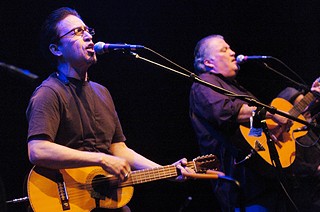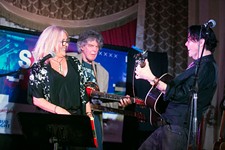Brown Sound: Los Lobos
9:30pm, Pavilion stage
By Jim Caligiuri, Fri., May 10, 2013
Of all six members of Los Lobos, Louie Pérez might be the most artistic.
When he and David Hidalgo founded the Grammy-garnering rock & roll institution out of their East L.A. high school in the early Seventies, Pérez was stuck behind the drums, singing only a couple of songs despite his being the band's primary lyricist. These days, he stands front and center onstage as a rhythm guitarist and occasional percussionist. Long a painter, he recently expanded into the performing arts with Evangeline REMIXED, a play based on the Los Lobos song he wrote with Hidalgo.
He's excited about the group's Pachanga debut even if he's not familiar with some of the bands performing.
"It's really interesting," he says, "because if you remember when the Rock en Español thing was happening a few years back, it seemed very specifically categorized to appeal to young Spanish speaking people in the U.S. Now, 10 years forward, there seems to be more of a dialogue between Mexican-Americans born here and the Mexican nationals who have been here. It's even going on in Mexico. I'm getting the vibe that some of the bands playing Pachanga are the kind of alternative stuff that goes on in Mexico."
Grateful that a festival where "the sound is brown" exists, Pérez acknowledges that when Los Lobos first began, such an idea would have been folly.
"Our thing has always been, 'We're not fully accepted in Mexico and we're not fully accepted in the United States.' From there it was, 'Where do we belong?' You can sit on your hands and go 'woe is me' or you can do what we did and say, 'We belong every-fucking-where!' We won a Grammy in 1983 and everybody was scratching their heads.
"We went out looking for similarities rather than differences. When you go onstage in Chapel Hill, North Carolina, it doesn't matter what color you are. They are there to hear the music. It's a cliche that music is a universal language, but there's some truth to it. The same thing happened when we played in Japan. There have been roadblocks, but we've done what we set out to do. Which is play our original music and still pay tribute to our heritage, while also serving as ambassadors, if you will, for our culture." – Jim Caligiuri









